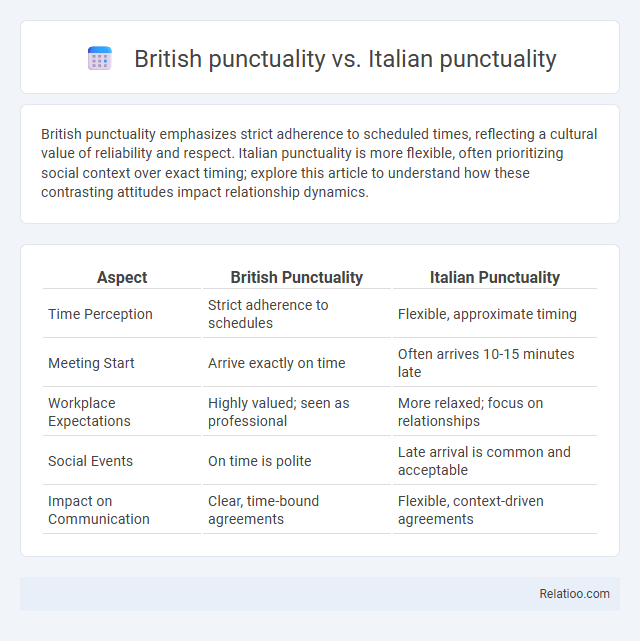British punctuality emphasizes strict adherence to scheduled times, reflecting a cultural value of reliability and respect. Italian punctuality is more flexible, often prioritizing social context over exact timing; explore this article to understand how these contrasting attitudes impact relationship dynamics.
Table of Comparison
| Aspect | British Punctuality | Italian Punctuality |
|---|---|---|
| Time Perception | Strict adherence to schedules | Flexible, approximate timing |
| Meeting Start | Arrive exactly on time | Often arrives 10-15 minutes late |
| Workplace Expectations | Highly valued; seen as professional | More relaxed; focus on relationships |
| Social Events | On time is polite | Late arrival is common and acceptable |
| Impact on Communication | Clear, time-bound agreements | Flexible, context-driven agreements |
Introduction: Understanding Punctuality in Different Cultures
Punctuality varies significantly across cultures, reflecting diverse social norms and values. British punctuality is often characterized by strict adherence to scheduled times, emphasizing respect and reliability. In contrast, Italian punctuality tends to be more flexible and socially oriented, where personal interactions may take precedence over exact timing, affecting Your expectations in cross-cultural settings.
Historical Roots of British Punctuality
British punctuality is deeply rooted in the Industrial Revolution, where strict schedules and factory shifts demanded precise timekeeping to maximize efficiency and productivity. In contrast, Italian punctuality often reflects a more flexible and relational approach to time, influenced by Mediterranean cultural norms and social customs prioritizing human interactions over rigid schedules. Understanding these historical and cultural differences highlights how punctuality varies not only between Britain and Italy but also shapes broader perceptions of time management worldwide.
Italian Attitudes Toward Time
Italian attitudes toward time emphasize flexibility and a relaxed approach often contrasting with British punctuality, which values strict adherence to schedules and timetables. In Italy, social interactions and relationship-building frequently take precedence over rigid timekeeping, reflecting a cultural preference for spontaneity and a less pressured sense of punctuality. This cultural difference impacts work environments and social settings, where Italians may view deadlines as guidelines rather than absolute constraints.
Social Expectations: British vs. Italian Perspectives
British punctuality is deeply ingrained in social etiquette, where arriving five minutes early is considered polite and shows respect for others' time. Italian social expectations around time are more flexible; being slightly late is often tolerated and can signify a relaxed approach to social interactions. Understanding these cultural differences helps navigate social norms effectively, as British society values strict adherence to schedules, while Italians prioritize interpersonal relationships over rigid timing.
Punctuality in Business Settings
Punctuality in business settings is highly valued in British culture, where arriving on time demonstrates professionalism and respect for others' schedules. In contrast, Italian business culture is more flexible with time, often allowing for a relaxed approach to meeting start times without it negatively impacting relationships. Understanding these cultural differences in punctuality can enhance cross-cultural communication and foster more effective international business interactions.
Public Transportation and Time Management
British punctuality, especially in public transportation, is often characterized by strict adherence to timetables and minimal delays, reflecting a cultural emphasis on time management and reliability. In contrast, Italian punctuality tends to be more flexible, with public transportation schedules frequently subject to delays and a more relaxed approach to time, influenced by social customs and local traffic conditions. Understanding these cultural differences in punctuality is crucial for effective time management when navigating public transportation systems in the UK and Italy.
Celebrations, Gatherings, and the Concept of “Fashionably Late”
British punctuality emphasizes strict adherence to time, especially for celebrations and gatherings, where arriving exactly on time is seen as a sign of respect. In contrast, Italian punctuality embraces a more relaxed approach, with "fashionably late" arrivals commonly accepted and even expected during social events. Understanding these cultural differences ensures Your participation aligns smoothly with the expected timing norms in each setting.
Challenges and Misunderstandings in Cross-Cultural Interactions
British punctuality emphasizes strict adherence to scheduled times, often viewed as a sign of professionalism and respect, which can clash with Italian punctuality's more flexible and relationally driven approach. This divergence creates challenges in cross-cultural interactions, where British individuals may perceive Italians as unreliable, while Italians may find British rigidity impersonal or stressful. Understanding these differences is crucial to avoiding misunderstandings and fostering effective communication in international business and social settings.
The Impact of Punctuality on Daily Life
British punctuality is characterized by strict adherence to scheduled times, reflecting a cultural emphasis on reliability and respect in both professional and social contexts. Italian punctuality tends to be more flexible, with a greater tolerance for delays, often prioritizing relationships and spontaneity over rigid timing. The impact of punctuality on daily life influences workplace efficiency, social interactions, and personal stress levels, where punctual cultures like Britain benefit from predictable routines, while more relaxed approaches like Italy foster a fluid and adaptable lifestyle.
Conclusion: Bridging the Gap Between British and Italian Timekeepers
British punctuality typically emphasizes strict adherence to schedules, reflecting a cultural value on efficiency and reliability, while Italian punctuality tends to be more flexible, prioritizing relationships and social interactions over exact timing. Understanding these differing time perceptions can help you navigate meetings and social engagements effectively, fostering better communication and mutual respect. Bridging the gap between British and Italian timekeepers requires cultural sensitivity, clear expectations, and adaptability to balance timeliness with the importance of personal connections.

Infographic: British punctuality vs Italian punctuality
 relatioo.com
relatioo.com